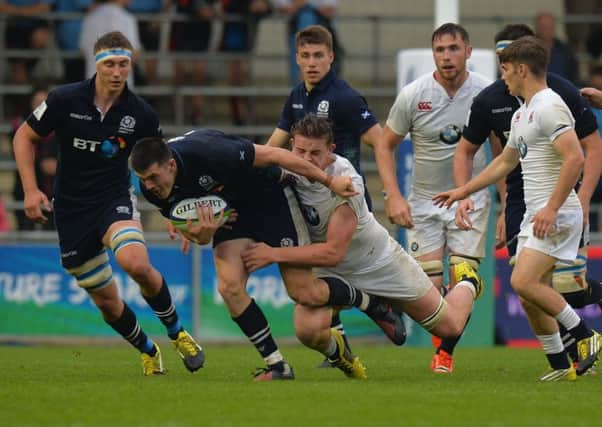Scotland under-20s ready to bounce back from England loss


It will be a difficult task for the Scotland management after the morale-lowering experience of losing by a pile of points to the host country, England, at the Manchester City Academy Stadium on Saturday in a match that exposed the perennial lack-of-depth weakness of Scottish age-grade rugby.
“We were in the same situation last year when we lost heavily to New Zealand but we picked ourselves up to run Ireland close and then beat Argentina,” said head coach Dalziel, pictured inset. “We know what we can do. We just didn’t do it against England.”
Advertisement
Hide AdAdvertisement
Hide AdOf course, it was obvious to most observers that Dalziel had not picked his strongest team for the England game. “Our strategy was always around the first and third games,” was his confirmatory statement.
What made matters worse for the England game was the injuries picked up against Australia. “We had to go into the England match with a number of changes in position and personnel,” he said. “Some of the players we brought in are still under-19 and remember this is a competition about development. And they were playing against a very good England side.”
As the win over Australia last Tuesday showed, Scotland can rise above their pay grade when they have a sufficient number of inspirational players in their side. And one of them certainly is the Glasgow Warriors prop, Zander Fagerson, who was rested for the England game.
“We have to have a managed programme for Zander. He’s had a huge amount of rugby this season with club, Pro12, under-20 and senior international. And don’t forget, he’s still a developing player.”
Without Fagerson and for the first half Murray McCallum, Scotland’s scrum suffered agonisingly against England. From a Scottish perspective it was both dispiriting and painful to watch as England bulldozed the Scotland scrum, winning penalties aplenty from which all their first-half points were garnered.
England had recognised that they would have a massive advantage in the set scrum as their head coach Martin Haag acknowledged, albeit in understated language. He said: “The scrum performed well. We knew it was an area we could exploit and we did that in the first half. Scotland were a little under-strength so you have to take that into consideration.”
Haag’s men were helped by Irish referee Andrew Brace, who took the attitude that scrum dominance equals penalties, a reminder of the urgent need for the law makers to get to grips with this unsatisfactory area of the game.
In the first half especially England took full advantage of the referee’s decisions to kick two early penalty goals, sweetly struck by the in-form Harry Mallinder, whose release by Northampton Saints for this championship has made a massive difference to England’s team morale.
Advertisement
Hide AdAdvertisement
Hide AdThen when Scotland were penalised yet again at scrum time, Mallinder booted the ball some 45 metres down the touchline to earn a line-out dangerously close to the Scotland line. The ensuing score from a catch and drive and completed by hooker Jack Walker, tipped by Sir Ian McGeechan as a future England international, was as predictable as it was easy.
England secured their bonus point try in similar fashion, replacement hooker Jack Singleton credited with the score. The other second-half tries were by the Leicester Tigers new-found back row talent Will Evans, the London Irish centre John Williams and the Saracens centre Max Malins, all coming from good handling by the backs in broken play, aided by numerous Scotland handling errors and at times flimsy defence.
By contrast Scotland never looked like crossing the England line or even threaten in the red zone. Neither did they kick penalty goals, stand-off Blair Kinghorn, not fully at ease in the ten position behind a retreating scrum and without adequate protection, missing two penalty kicks at goal in the first half.
On such a dark day for Scotland it was hard to find positives, but there were a few individual performances to raise some cheer, notably a lively display by replacement scrum half Charlie Shiel, and good ‘box’ kicking from the half back.
“Charlie’s not had a lot of game time but he’s developing every day. He came out of the England game with credit,” noted Dalziel.
For the current group of players who achieved that historic win over Australia, this will be a lesson, as they say, in the financial services industry, that past performance is no guarantee of future success.